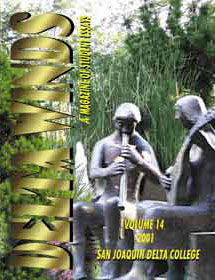Coming Home: A Study in Contrast
 Delta Winds: A Magazine of Student Essays
Delta Winds: A Magazine of Student Essays
A Publication of San Joaquin Delta College
2001
Coming Home: A Study in Contrast
Ken Moffett
Traditionally, America has always supported its armed forces and has shown great respect for those in uniform. In 1919, at the end of World War I, the Doughboys returned home from Europe to ticker-tape victory parades, marching bands, speeches, and the good will of all Americans. Additionally, when the soldiers returned home from World War II and the Korean War, they were treated as heroes. A euphoric atmosphere overtook the nation, and celebrations were held in their honor all around the country. Unfurled American flags that decorated streets and homes could be seen waving in the breeze. It was as if they, too, were welcoming home the G.I.'s. The reveling continued non-stop for weeks; it seemed as though the nation and its citizens could not do enough for the returning service men and women. A grateful nation was anxious to show its admiration and support to the returning soldiers.
Unfortunately, this was not the case when the soldiers returned home from Vietnam. As a result of America's loss in Vietnam, there was a misperception that the men who fought there did not measure up to their predecessors in World War II and Korea. "Nothing could be further from the truth," said General Frederick C. Weyand, United States Army. During the course of General Weyand's military career, he served in World War II, Korea, and Vietnam. While in Vietnam, General Weyand commanded the Twenty-fifth Infantry Division, the division portrayed in the film Platoon. General Weyand estimates that during his tours, he visited soldiers in the field more than one thousand times. And, despite the negative and hostile attitude of the news media -- not only towards the war but also towards the soldiers -- the morale and spirits of the soldiers remained high.
Perhaps the cruelest aspect of the war was the treatment of the returning soldiers. Unlike the hero status given to the returning soldiers form World War II, the soldiers that served in Vietnam were portrayed as baby killers, psychos, drug addicts and war mongers. It was not an uncommon scene for returning soldiers to be confronted at airports by protesters carrying signs with anti-war slogans. The protesters used the signs to attack the soldiers and even threw urine at the veterans. In some instances, soldiers were refused service in restaurants. I remember an incident after I returned home; one of my close friends and I were walking down a street in Oakland, California, when a filthy, long-haired, flea-infested piece of street trash approached us and began yelling insults at us. Mike wanted to take him out right there, but we decided to pass it up. This common sight on the streets of America during the Vietnam War years was in no way reminiscent of the homecoming given the returning soldiers from previous wars.
Not to be outdone by the protesters and howling mobs wandering aimlessly in the streets, the entertainment industry lost no time getting into the act. Movies and television shows began depicting returning soldiers as deranged monsters even before the war ended. During the Second World War and Korea, Hollywood was solidly behind the war effort and the troops. Films, such as Guadalcanal Diary, Wake Island, The Flying Leathernecks, and They Were Expendable were all examples of films made during the 1940s that displayed the courage of America's fighting men.
However, in the 1960s this all changed. One television show that seemed to display an inordinate amount of animosity towards soldiers who had served in Vietnam was Hawaii Five O. I recall watching the show and thinking, "Are all these guys nuts?" Perhaps it was because the show was set in Hawaii where a large number of soldiers went on R&R, a military term for rest and recuperation. A large number of personnel were also stationed in Hawaii, so that gave the writers plenty of fodder for their scripts.
With few exceptions, most Hollywood celebrities did all they could to show their lack of support for the war and the troops. But none was more notable than Jane Fonda. I'll never forget the summer day in 1972 when, upon returning to our compound after a patrol, I picked up a copy of The Stars and Stripes. As I headed to my hooch to relax, I unfolded the paper and on the front page was a picture of Jane Fonda standing behind an anti-aircraft gun in North Vietnam. Needless to say, there has never been, nor will there ever be, a Jane Fonda workout video or film in my home. Conversely, I have a large library of films starring John Wayne, an ardent supporter of the war and the troops. In fact, he even went to South Vietnam to visit soldiers in the field and in the hospitals.
My father retired from the military, so I grew up around service personnel. I never once heard my father say that he had ever been treated the way we were seeing the returning soldiers treated. No, unlike the soldiers who had fought in other wars, the veterans from the Vietnam War returned home not to find parades, bands, speeches and celebrations. However, General Weyand summed it up this way: "America should have been proud of them from the start, for they were a remarkable group of young men and women."






